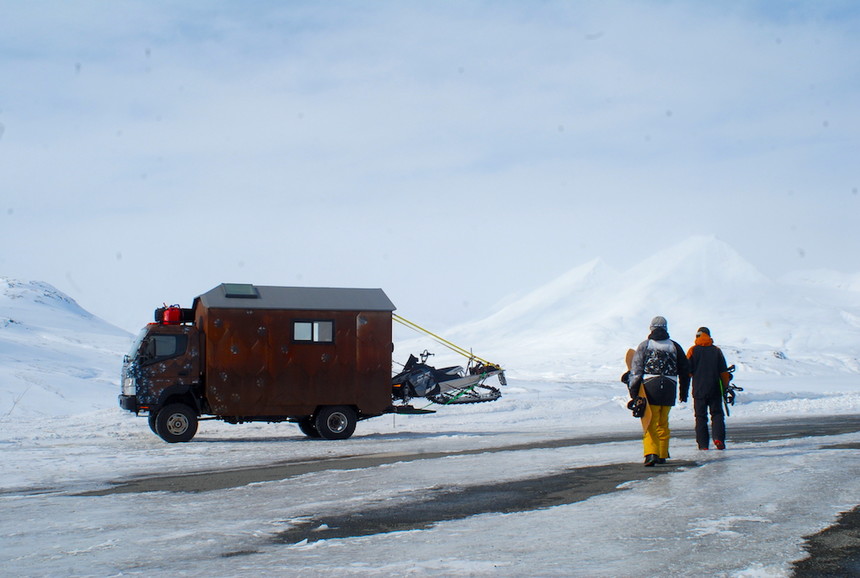
Mike Basich's name has long been synonymous with innovation in snowboarding.
Way back in the early '90s, when Basich was a pro snowboarder moonlighting as a world-renowned photographer, he helped innovate the first-person style of photography that is all-too-common in the action sports world.
RELATED: This ain't #vanlife: Austin Smith does life on the road his way
Basich was eons ahead of the current trends of tiny home living/van life that dominate social media feeds today, building his off-the-grid tiny home on Donner Pass nearly a decade ago where, as the 45-year-old Basich puts it, "you get to create your own time."
Now, with the #vanlife trend in full effect, Basich has once again raised the bar for life on the road by debuting his newest creation–a hyper-customized, retrofitted Mitsubushi Fuso.
We caught up with Basich to hear more about his new vehicle, and to pick his mind on how popular the #vanlife trend has become.
TGR: What’s it like living transitioning to from the off-grid home to living in the van?
Mike Basich: As you know I have the cabin at Donner summit, but I’ve always had a camper or traveling vehicle my whole life.
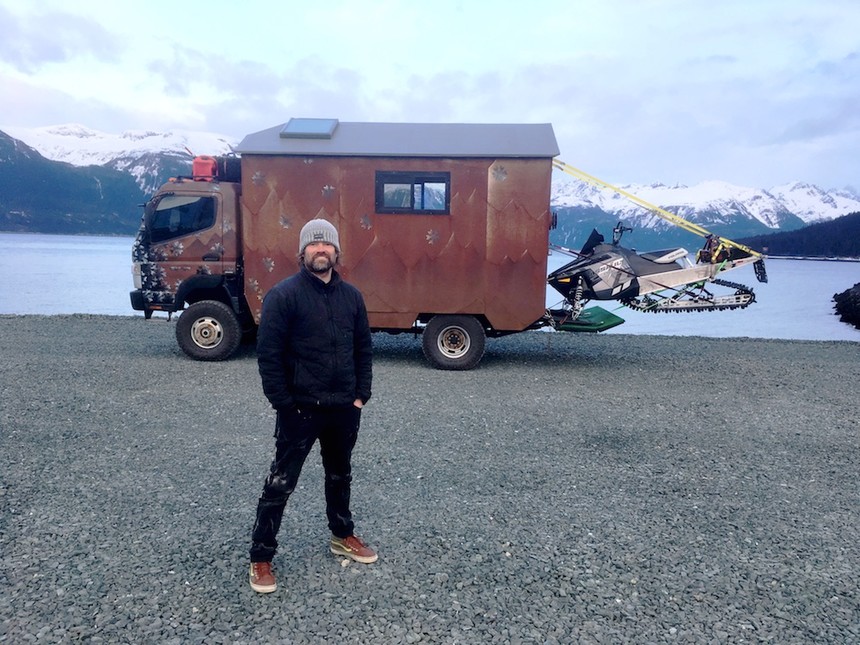 Basich has been on the van life trend long before hashtags were a thing. Mike Basich photo.
Basich has been on the van life trend long before hashtags were a thing. Mike Basich photo.
The Donner cabin was as a dream project–I spent somewhere between five and 10 years doing that. But after creating that amazing place I still had the itch to adventure. So I dove back into building out a vehicle for traveling.
I first built a Dodge truck that could haul a sled but could still be parked at my Donner spot. That worked for a while, but I missed the vans I used to have growing up that I could stand up in. I built a tiny home trailer to tow with the truck, but I got sick of how long it was and how hard it was to park in cities.
RELATED: The legendary life of Mike Basich
The van I'm in now is probably my sixth vehicle I've transformed, and I've put all my experience into a compact vision. It’s actually smaller than my Dodge truck and fits in a parking spot really easy.
On top of that, I wanted to bring in everything I like doing into the van, so I can fit the snowmobile in it.
Your van fits a snowmobile inside it? Can you still sleep in it with the sled?
MB: It's a unique creativity test to see what I can do on the road and what I really need. I can fit my sled inside the van if I load the sled backwards, and the track of the just overhangs the bed slightly.
It's not spacious, but you can live in it full-time, and it allows me to cut down on my ferry rides to-and-from Alaska. Cutting down on those trips from Bellingham, Washington means saving 1,500-1,800 dollars each way.
You obviously put a ton of thought into the build. Who made the metal designs on the exterior?
MB: That was all me.That rustic, metal style was inspired by my trailer tiny home, which was inspired by the fireplaces I have. It’s got that old railroad 1860’s style.
I like testing and trusting my work, and I was working on a build where I asked myself, "How can I make the vehicle be like a Transformer?"
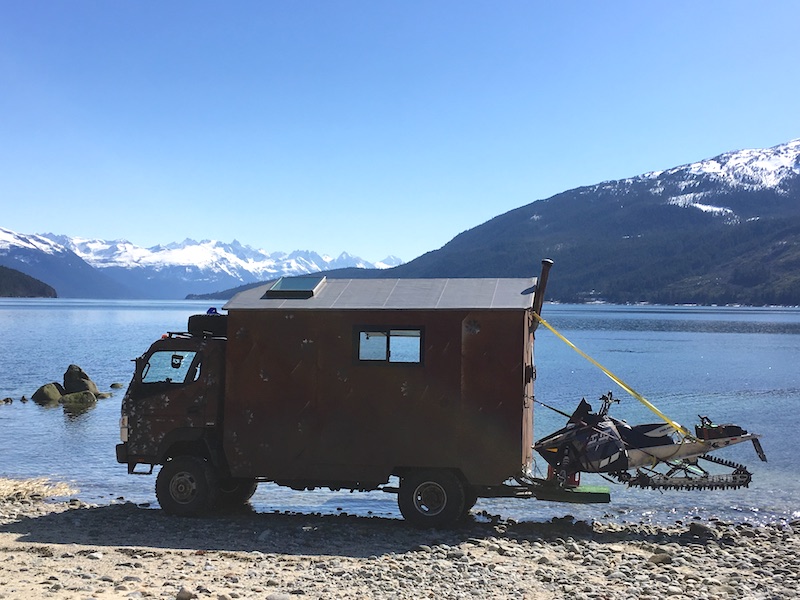 It's ultra-efficient, but Basich is able to tow around his snowmobile and still live in the van full-time. Not bad, and the views it affords him aren't too shabby either. Mike Basich photo.
It's ultra-efficient, but Basich is able to tow around his snowmobile and still live in the van full-time. Not bad, and the views it affords him aren't too shabby either. Mike Basich photo.
The way I take on projects, all I'll think about for a week or 10 days is how I want it to look. The truck sat in my shop and I was looking at the vehicle with no bed on the back, and just envisioned it.
I came up with the design–how the doors open, one side folds down, the other side comes up like a clam. It opens like that on the passenger side for beach access, and I have a bathtub in the floor I can just sit in and look out. Then, on the driver side, the kitchen slides out to give me extra room.
It might seem obvious, but would you say you like living in small spaces more than more spacious abodes?
MB: I do like smaller spaces, and I think the main reason is because it’s easy maintenance.
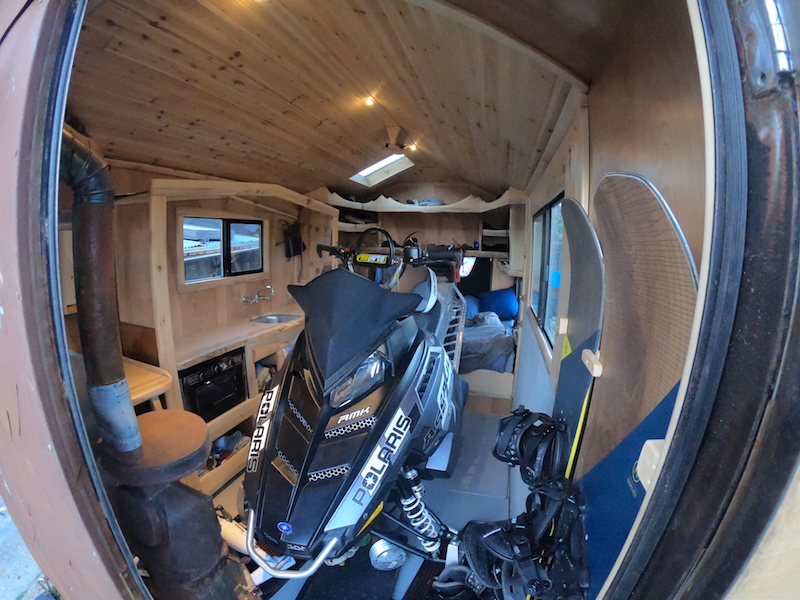
I used to have a big house and hated the amount of time I spent cleaning it and fixing it. A small space for me, I can use it for multiple reasons. For instance, the bed in the van is a dining table, it's where I sleep at night, it's my desk where I conduct business.
I feel more cozy when I know space is well-used. Plus, I try to spend most of my day outside. So my living space is mostly used just to stay warm, or if I have to get cleaned up and sleep and cook.
What's it like going from off-grid living where you're fairly isolated to van life where you are constantly going to new towns and meeting new people?
MB: The off-grid living at the cabin, you’re right: You're completely by yourself. Time is very slow, and–in a sense–you get to create your own time, which is nice.
But at the end of the day, I do have the itch to connect with humans. I think everyone on Earth has that itch. And that's where the van is wonderful, because part of my goal is to interact with people.
It can definitely be a bit overwhelming with the van at times though, because when you create something that sticks out as much as the van does, people are going to come up to the van no matter what town you're in and want to see it and talk about it. It's very social.
The coolest thing between the duo is that when I'm in my home–whether in the cabin or the van–I get this really fun feeling that life is not hard. There are no taxes, no electrical bills; all these things that are normally just monthly bills aren’t there. Everything is a little simpler and easier to control and it gives you time for other stuff. It’s pretty floaty feeling. It just feels nice cause everything is so small and easy to fix you don’t have to call someone to fix the roof leak or the plumbing–you built it and it’s all straightforward and low cost.
Do you think the importance of being handy–being able to build something on your own–is becoming devalued in society?
MB: Definitely. One of the biggest joys in life, and one of the biggest values, comes from actually building something. Life is about experiences, the closer you can get to appreciating the things you have in your life, the more value you'll get from life. And there aren't too many ways you achieve that besides doing something for yourself, whether that's growing your own food or drilling your own well to draw water.
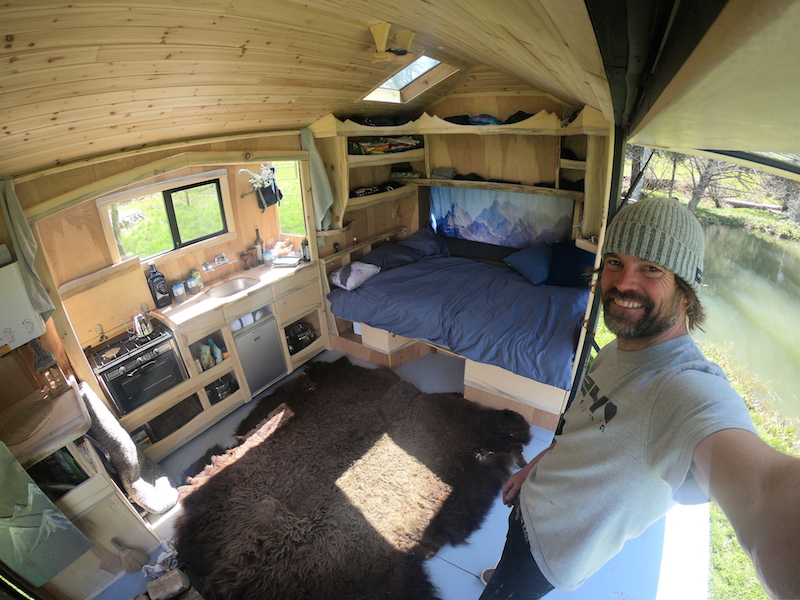
Part of my drive is to build or experience something never before seen. I like building things that may have not been built before just to see what it would look like. The stuff I like to do I can’t go buy. There's a company that builds out these vans for like $300,000. If I'm going to spend that much, I want it to fly.
I do want to say one thing though. The thing I hear the most on the road is people who come up to me and are like, "Wow, you must be really good at what you do." At age five I started swinging hammers and I've been woodworking ever since, but I wasn’t good at it in the beginning. Failure is a part of the process. No matter how well you plan it out, you will fail at some point.
A lot of people I meet have been drawing out their adventure rig for five years–I've seen people 3D mapping out their build–but they're still waiting on someone else to say "Do it." They think they need more info before they start the build.
It all comes down to how much you are willing to risk. If you take on building out a house or a van or whatever, you have to risk what you're willing to lose and just do it. The odds of you losing it all are minimal, but it's still going to take you a long time. Understanding really basic stuff about building takes time
So what did this van cost you in time and money?
MB: The vehicle I got was about $33,000. And that's more then what I typically pay, but I wanted a newer vehicle as I wanted this one to last a while. So I got this one with 30,000 miles on it. Then on material and products like the stove and refrigerator, I probably spent another $8,000 on all that.
Because I've built other vans before, I've been pretty quick building this one with relatively few mistrakes. There's probably about 20 hours left, but I've probably invested about three or four months into this build building it about 12 hours a day. So it's probably close to 1,000 hours of work at this point.
How does it feel to see the van/tiny home movement become so popular in society?
MB: It’s exciting for me, to see how the movement has grown. I think I’ve experienced some stuff where I got to be a part of the movement of tiny homes and vans and it's been awesome.
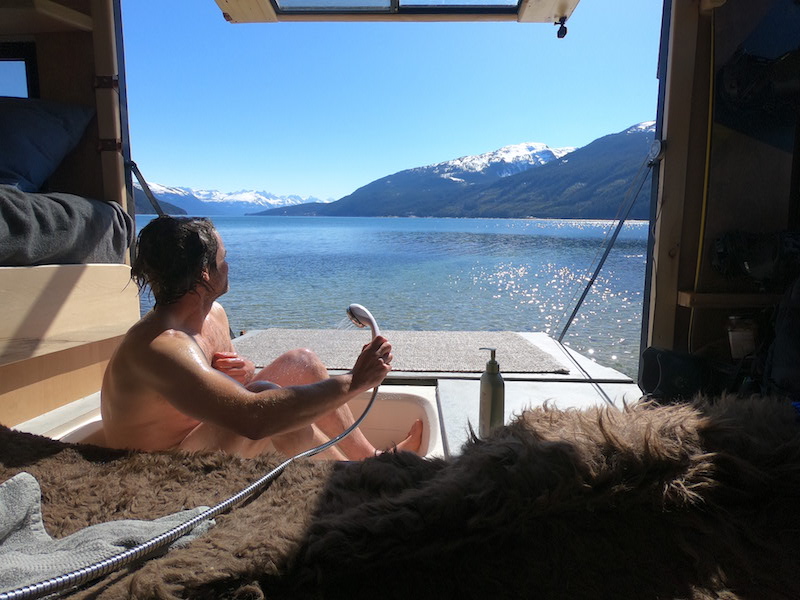
I'm not an expert at building, but I love it so much I want to be a part of the creativity. I'll share anything I can to inspire people to live more simply.
So what's next?
MB: My time right now is all about organizing everything I have. I have a nice shop I've set up, and I'm just trying to organize it so if something wants something built I can come in and build something creative for them.



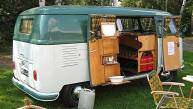


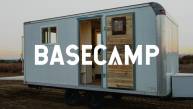






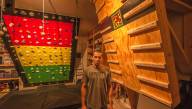


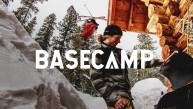

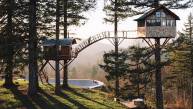
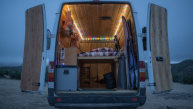
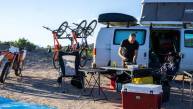
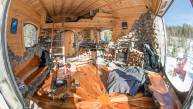
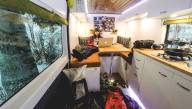
robinjack
June 26th, 2018
I am not really excellent with English but I line up this really easygoing to understand . Driving School Simulator
robinjack
June 26th, 2018
This kind of lovely blog you’ve, glad I found it!?? Arnold Schwarzenegger steroids or natural
MySentimentsExactly
December 31st, 2018
Thank you for sharing this post. it is an amazing post to read. i really appreciate your work. keep sharing with us.
https://mysentiments-exactly.com/send-gifts-neighbors-usa
sona khan
July 29th, 2019
Thank you for sharing
Thank you for sharing
uper Dance
Thank you for sharing
Thank you for sharing